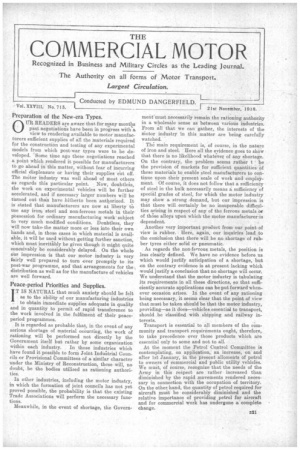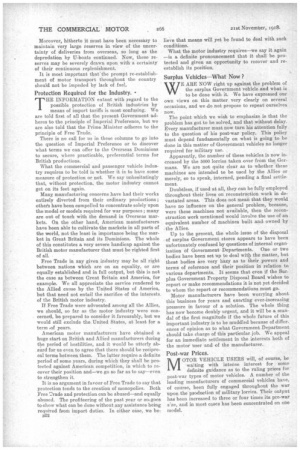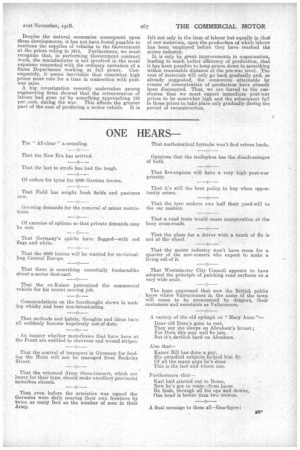Preparation of the New-era Types.
Page 1

Page 2

Page 3

If you've noticed an error in this article please click here to report it so we can fix it.
OUR READERS are aware that for many months past negotiations have been in progress with a. view to rendering available to motor manufacturers sufficient supplies of all the materials required for the construction and testing of any experimental models from which post-war types were to be developed. -Some time ago these negotiations reached a point which rendered it possible for manufacturers to go ahead in this matter, without fear of incurring official displeasure or having their supplies cut off. The motor industry was well ahead of most others as regards this particular point. Now, doubtleis, the work on experimental vehicles will be further accelerated, and if necessary larger numbers will be turned out than have hitherto been authorized. It is stated that manufacturers are now at liberty to use any irons steel and non-ferrous metals in their Possession for ordinary manufacturing work subject to very much modified conditions. Doubtless, they will now take, the matter more or less into their own hands and, in those cases in which material is available, it will be used without getting further sanction, which must inevitably be given though it might quite conceivably be considerably delayed. On the whole our impression is that our motor industry is very fairly well prepared to turn over promptly to its post-war programme, and that arrangements for the distribution as well as for the manufacture of vehicles are well forward.
Peace-period Priorities and Supplies.
IT IS NATURAL that much anxiety should be felt as to the ability of our manufacturing industries to obtain immediate supplies adequate in quality and in quantity to permit of rapid transference to the work involved in the fulfilment of their peaceperiod programmes.
It is regarded as probable that, in the event of any serious shortage of material occurring, the work of rationing will be performed not directly by the Government itself but rather by some organization within each industry. In those industries which have found it possible to form Joint Induarial Councils or Provisional committees of a similar character under the Ministry of Reconstruction, these will, no doubt, be the bodies utilised as rationing authorities.
In other industries, including the motor industry, in which the formation of joint councils has not yet proved possible, the probability is that the existing Trade Associations will perform the necessary functions.
Meanwhile, in the event of shortage, the Govern ment'must necessarily remain the rationing authority in a wholesale sense as between various industries. From all that we can gather, the interests of the niotor industry in this matter are being carefully watched.
Th6 main requirement is, of course, in the nature of iron and steel. Ilere all the evidence goes to show that there is no likelihood whatever of any shortage. On the contrary, the problem seems rather t be the provision of markets for sufficient quantities of these materials to enable steel manufacturers to continue upon their present scale of work and employment. Of course, it does not follow that a sufficiency of steel in the bulk necessarily means a sufficiency of special grades of steel, for which the motor industry may show a strong demand, but our impression is that there will certainly be no insuperable difficulties arising in respect of any of the ferrous metals or of those alloys upon which the motor manufacturer is dependent. Another very important product from our point of view is rubber. Uere, again, our inquiries lead to the conclusion that there will be no shortage of rubber tyres either solid or pneumatic. As regards the non-ferrous metals, the position is less clearly defined. We have no evidence before us which would justify anticipation of a shortage, but on the contrary evidence is at present lacking which would justify a conclusion that no shortage will occur. We understand that the motor industry is tabulating its requirements in all these directions, so that sufficiently accurate applications can be put forward whenever occasion arises. In the event of any rationing being necessary, it seems clear that the point of view that must be taken shOuld be that the motor industry, providing—as it does—vehicles essential to transport, should be classified with shipping and railway interests. Transport is essential to all members of the community and transport requirements ought, therefore, to take precedence over those products which are essential only to some and not to all. At the moment the Petrol Control Committee is contemplating, on application, an increase, on and after 1st January, in the present alloments of petrol to owners of commercial and public utility vehicles. We must, of course, recognize that the needs of the Army in this respect are rather increased than diminished by the rapid movements rendered necessary in connection with the occupation of territory. On the other hand, the quantity of petrol required for aircraft mutt be considerably diminished and the relative importance of providing petrol for aircraft and for commercial work has undergone a complete change. Moreover, hitherto it must have been necessary to maintain very large reserves in view of the uncertainty of deliveries from overseas, so long as the depredation by U-boats continued. Now, these reserves may he severely drawn upon with a certainty of their continuous replenishment.
It is most impertant thaf the prompt re-establishment of motor transport throughout the country shoulki not be impeded by lack of fuel,
Protection Required for the Industry. •
THE INFORMATION extant with regard to the possible protection of British industries by means of import tariffs is most confusing. We are told first of all that the present Government adheres to the principle of Imperial Preference, but we are also told that the Prime Minister adheres to the principle of Free Trade.
There is no call for us in these columns to go into the question of Imperial Preference or to discover what terms we can offer to the Overseas Dominions to secure, where practicable, preferential terms for British productions.
What the commercial and passenger vehicle industry requires to be told is whether it is to have some measure of protection or not. We say unhesitatingly that, without protection, the motor industry cannot get on its feet again.
Many manufacturing concerns have had their works entirely diverted from their ordinary productions ; others have been compelled to concentrate solely upon the model or models required for war purposes ; many are out of touch with the demand in Overseas markets. On the other hand, American manufacturers have been able to cultivate the markets in all parts of the world, not the least in importance being the market in Great Britain and its Dominions. The whole of this constitutes a very severe handicap against the British motor manufacturer that must be righted first of all.
Free Trade in any given industry may he all right between nations which are on an equality, or are equally established and in full output, but this is not the case as between Great Britain and America, for example. We all appreciate the service rendered to the Allied cause by the United States of America, but that need not entail the sacrifice of the interests of the British motor industry. If Free Trade were advocated among all the Allies, we should, so far as the motor industry were concerned, be prepared to consider it favourably, but we would still exclude the United States, at least for a term ref years.
American motor manufacturers have obtained a huge start on British and Allied manufacturers during the period of hostilities, and it would be utterly absurd for us even to agree that there should be reciprocal terms between them. The latter require a definite period of some years, during which they shall be protected against American competition, in which to recover their position and—we go so far as to say—even to strengthen it.
It is no argument in favour of Free Trade to say that protection tends to the creation of monopolies. Both Free Trade and protection can be abused—and equally abused. The profiteering of the past year or so, goes to show what can be done without any assistance being required horn import duties. In either case, we be n22 ieve that means will yet be found to deal with such conditions.
What the motor industry requires—we say it again —is a definite pronouncement that it shall be protected and given an opportunity to recover and reestablish its position.
Surplus Vehides—What Now ?
WE ARE NOW right up against the problem of the surplus Government vehicle and what is to be done with it. We have expressed our own views on this matter very clearly on several occasions, and we do not propose to repeat ourselves now.
The point which we wish to emphasize is that the problem has got to be solved, and that without delay. Every manufacturer must now turn his attention fully to the question of his post-war policy. This policy must depend fundamentally on what is going to be done in this matter of Government vehicles no longer required for military use.
Apparently, the number of these vehicles is now in reased by the 5000 lorries taken over from the Germans. We are not quite clear as to whether these machines are intended to be used by the Allies or merely, so to speak, interned, pending a final settlement.
Doubtless, if used at all, they can be fully employed throughout their lives on reconstruction work in devastated areas. This does not mean that they would have no influence on the general problem, because, were these machines not available, then the reconstruction work mentioned would involve the use of an equivalent number of machines built andowned by .the Allies.
Up to the present, the whole issue of the disposal of surplus Government stores appears to have been unfortunately confused by questions of internal organization of Government Departments. One or two bodies have been set up to deal with the matter, but these bodies are very hazy as to their powers and terms of reference and their position in relation to various departments. It seems that even if the Surplus Government Property Disposal Board wishes to report or make recommendations it is not yet decided to whom the report or recommendations must go. Motor manufacturers have been worrying about this business for years and exerting ever-increasing pressure in favour of a, solution. The whole thing has now become doubly urgent, and it will be a scandal of the first magnitude if the whole future of this important industry is to be muddled because of differences of opinion as to what Government Department should take charge of this particular job. We appeal for an immediate settlement in the interests both of the motor user -and of the manufacturer.
Post-war Prices.
MOTOR VEHICLE USERS will, of course, be waiting with intense interest for some definite guidance as to the ruling prices for post-war types of motor vehicles. A number of the leading manufacturers of commercial vehicles have, of course, been fully engaged throughout the war upon the production of military lorries. Their output has been increased to three or four times its pre-war s'ze, and in most cases has been concentrated on one model. Despite the natural economies consequent upon these developments, it has not been found possible to continue the supplies of vehicles to the Government at the prices ruling in 1914. Furthermore, we must recognize that in performing Government contract work, the manufacturer is not involved in the usual expenses connected with the ordinary operation of a Sales Department working at full power. Consequently, it seems inevitable that somewhat high prices must rule for a time in connection with postwar sales.
A big investigation recently undertaken among engineering firms showed that the remuneration of labour had gone up by something approaching 130 per,cent. during the war. This affects the greater part of the cost of producing a motor vehicle. It is felt not only in the item of labour but equally in that of raw materials, upon the production of which labour has been employed before they have reached the motor industry. It is only by great improvements in organization, leading to much better efficiency of production, that it has been possible to keep prices down to something within reasonable distance of the pre-war level. The cost of materials will only go back gradually and, as already suggested, the economies attainable by reason of concentration of production have already been discounted. Thus, we are forced to the conclusion that we must expect immediate post-war prices to be somewhat high and the subsequent fall in those prices to take place only gradually during the period of reconstruction..






















